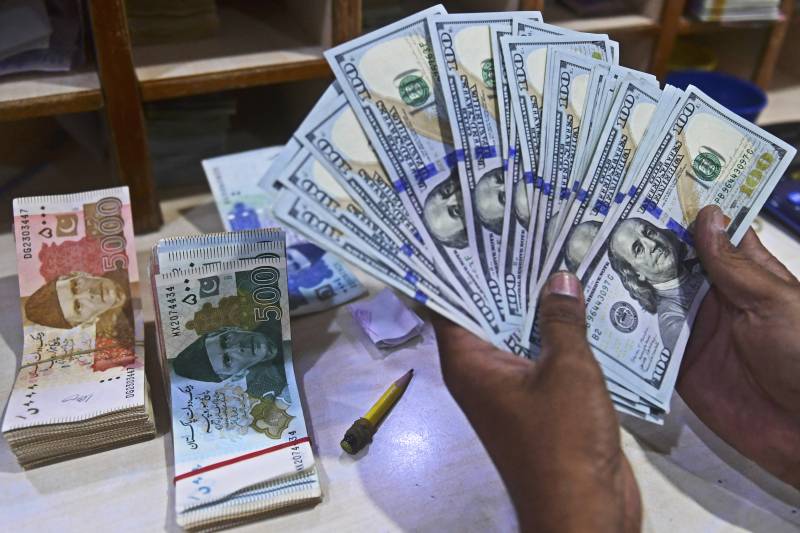US dollar slashes Pakistani rupee amid political chaos

Stay tuned with 24 News HD Android App

As the political chaos is deepening and country’s forex reserves are plummeting, the Pakistani rupee saw a tumbling against the US dollar during Tuesday’s interbank trading, reported 24NewsHD TV channel.
According to the State Bank of Pakistan, the previously resilient rupee slumped against the US dollar during trading on Tuesday. The value of greenback was appreciated by 63 paisas and ended the day at Rs262.51.
Interbank closing #ExchangeRate for todayhttps://t.co/sT5B6UhYyw pic.twitter.com/l955pDOD74
— SBP (@StateBank_Pak) February 21, 2023
Yesterday, the US dollar was closed at Rs261.88 after the local unit went up by a healthy margin of 94 paisas.
Interbank closing #ExchangeRate for todayhttps://t.co/47hbhMZSRQ pic.twitter.com/vPs9Ep2Tcr
— SBP (@StateBank_Pak) February 20, 2023
The decline in the value of Pakistani rupee could be attributed to ongoing political crisis in Pakistan and bleak economic macros.
The country seems to have entered into an unending political struggles as opposition and government are wrangling over polls amidst severe economic morass.
According to State Bank of Pakistan, the Real Effective Exchange Rate (REER) index depreciated to 92.8 in Jan 2023 as compared to 96.2 in Dec 2022.
The REER index depreciated to 92.8 in Jan 23 as compared to 96.2 in Dec 22. For details see https://t.co/0pjvdnFNYwhttps://t.co/Ird7FDRPyG pic.twitter.com/3OZnJeBEx9
— SBP (@StateBank_Pak) February 20, 2023
Faced with critically low foreign exchange reserves, the government has already halted most imports -- apart from food and pharmaceuticals.
Pakistan posted a current account deficit (CAD) of $3.8 billion in 7MFY23, improving by 67.13% YoY as compared to the same period last year, the central bank data showed on Monday.
In the month of January 2023, CAD narrowed by 90% YoY and 16.55% MoM to $242 million compared to $2.46mn in January 2022 and $290mn in December 2022.
It is pertinent to note that the country witnessed a 23 months low CAD this month mainly due to ban on imports.
Current Account Deficit (CAD) recorded $ 0.2 billion in Jan 2023 against a deficit of $2.5 billion in Jan 2022. https://t.co/q3LNv3HgLshttps://t.co/Od8ikVvpBF pic.twitter.com/C3v9k4pZDb
— SBP (@StateBank_Pak) February 20, 2023
The data issued by the SBP revealed that FDI dropped to $683.5 million during first seven months of the current fiscal year as compared with $1.22 billion in the corresponding months of the last fiscal year.
Years of financial mismanagement and political instability have pushed Pakistan's economy to the brink of collapse, exacerbated by a global energy crisis and devastating floods that submerged a third of the country in 2022.
Yesterday, the National Assembly approved a supplementary finance bill that increases sales tax from 17 to 25 per cent on imports ranging from cars and household appliances to chocolates and cosmetics.
People will also have to pay more for business-class air travel, wedding halls, mobile phones, and sunglasses. A general sales tax was raised from 17 to 18 percent.
Pakistan is desperate to unlock the next tranche of a $6.5 billion loan facility. "Those who are making good money in public or private sectors need to contribute to the economy," IMF Managing Director Kristalina Georgieva told German state broadcaster Deutsche Welle at the weekend. "It shouldn't be that the wealthy benefit from subsidies. It should be the poor who benefit from them."
Finance Minister Ishaq Dar told parliament when tabling the bill this month that the luxury tax would generate an additional 170 billion rupees. "These are the items which are widely used by the rich class," he said, adding it would "put the minimum burden on the common man".
While an IMF cash injection will not be enough to rescue Pakistan on its own, it is necessary to boost confidence and open the doors for friendly nations such as Saudi Arabia, China and the United Arab Emirates to offer further loans.
Reporter Ashraf Khan
